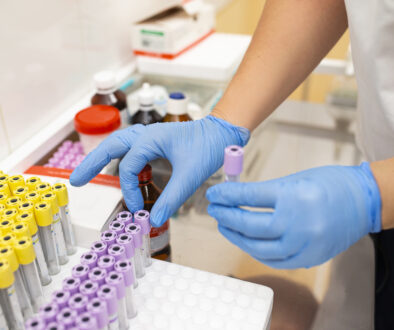5 Reasons Why You Should Never Skip Your Pap Smear
Updated November 2021
We understand.
You’re busy, and it’s far too easy to put off your regular Pap smear or annual exam. During COVID-19, you may have even decided to wait until the situation with the pandemic improved.
We want you to know that your Pap smear is a test that is far too important to skip and doing so means cervical precancerous changes may go undetected until they have reached an advanced stage or turned into cancer.
We are still taking all precautions during this pandemic to ensure your safety even as the situation seems to be changing every day. We’ll look at a few of these precautions as well as review the main reasons your Pap smear is too important to skip.
“An annual exam is about much more than a Pap smear,” said Dr. Martinelli. “It’s an important time to evaluate your overall health, both physical and mental. We understand that during the coronavirus, you may be worried about visiting a health care practice. We want to assure you that we have taken every precaution to ensure that you are safe.”
5 Reasons You Should Never Skip Your Pap Smear
1. It’s the most effective screening tool for cervical cancer.
Did you know that cervical cancer used to be the leading cause of cancerous deaths in American women? For over 40 years, Pap tests and regular screenings have dramatically reduced the incidence of cervical cancer deaths.
Pap smears remain the most effective screening for cervical cancer. When caught in its earliest stages, cervical cancer is highly treatable.
2. Cervical Cancer is the fourth most common cancer in women worldwide.
While Pap smears have decreased the number who die from the disease, it still remains one of the most common forms of cancer.
3. 80 percent of sexually active Americans have HPV—and many don’t know it.
Human papillomavirus (HPV) remains the primary cause of cervical cancer. There are roughly 79 million Americans who currently have HPV, and an additional 14 million are newly infected annually.
Because so many who have HPV are unaware, they can unknowingly spread it to others. In fact, you may not even know if you have HPV! The prevalence of HPV means that regular Pap smears are always a good idea.
We are seeing a decrease in the rates of HPV infections since the introduction of the vaccine in 2006.
4. Your Pap smear is also a good time to discuss other health issues with us.
We care about your overall health, and often your visit for a regular Pap smear is an opportunity to talk to us about any issues that may be bothering you.
5. Early detection of cervical cancer means a better outcome.
Pap smears help detect cervical cancers at its earliest, and most treatable stage. If caught early on, the five-year survival rate for cervical cancer is 92 percent if it is detected before it has spread.
Cervical Cancer: Facts and Figures
According to the American Cancer Society, In 2020, an estimated 13,800 cases of cervical cancer were diagnosed, and 4,290 women die each year from cervical cancer.
These cases arise from approximately 3 million abnormal Pap smears that are detected annually.
Early detection is critical: cervical pre-cancers are diagnosed much more often than invasive cancer.
Many older patients do not realize that they are still at risk of cervical cancer. In fact, more than 20 percent of the cases of cervical cancer are found in women over 65 years old.
How Often Do You Need a Pap Smear?
This depends upon if you’ve had any abnormal Pap smears in the past.
Typically we recommend that patients who are 21 to 29 have a Pap smear every 3 years. Those who are 30 to 65 years old should have a Pap smear and an HPV test every three to five years.
However, if patients prefer, we will do a Pap smear yearly.
If you have a history of cervical cancer or you’ve previously had abnormal results, then we may recommend testing every year or beyond age 65.
Want to test your knowledge about cervical cancer? Take this quiz from the Centers for Disease Control.
Do You Need a Pap Smear if You’re Not Sexually Active?
Yes. We recommend that if you are at least 21, you should start cervical cancer screening. How often you should be screened will depend upon a number of factors such as those outlined above, including whether or not you’ve ever had an abnormal Pap smear.
How Painful Is a Pap Smear?
While most women feel some level of discomfort and others may feel a slight pinch, it should not be a painful experience.
If your Pap smear causes you pain, we want to know about it! Please discuss this with us so we can work with you.
What If I Have an Abnormal Pap Smear?
If abnormal cells are found, you may need to have a colposcopy or a LEEP procedure.
Preparing for Your Pap Smear
There are a few things you should avoid before getting a Pap smear, including:
- Sex
- Using a tampon
- Douching
- Using medication or cream in your vagina
- Using spermicidal creams or jellies
While we can do a Pap test while you’re having your period, it’s best to schedule the exam when you’re not menstruating.
Should I Shave Before a Pap Smear?
Whether or not you shave “down there” is a personal choice. It does not affect the test in any way.
What Are the Signs of Cervical Cancer?
In its earliest stages, there are no symptoms, but as the cancer progresses, you may experience:
- Unusual discharge
- Painful intercourse
- Leg pain
- Swelling
- Abnormal vaginal bleeding
- Unintentional weight loss
However, there are other conditions that can cause similar symptoms. That’s why if you’re experiencing any of the conditions listed above, you should schedule an appointment with us.
Your Pap smear is also a good time to discuss other health issues with us.
We care about your overall health, and often your visit for a regular Pap smear is an opportunity to talk to us about any issues that may be bothering you. We’ll discuss items such as:
Birth Control
If you’re unsure about what method of birth control is right for you, we can help. There are many options, and we can help determine which one is right.
Problematic Periods
If you have heavy, painful, or irregular periods, we can work together to make them better.
Preconception Planning
If you’re planning to get pregnant, we’d like to speak with you. We want to go over ways that you and your baby can have the healthiest start in life possible. This includes things such as taking prenatal vitamins that are rich in folic acid.
Lab Results
We want to monitor your blood work for signs of high cholesterol, diabetes and other chronic diseases. We can perform the screening tests, and we are glad to work in collaboration with your primary care provider to manage these conditions.
Mental Health
Are you feeling overwhelmed with anxiety? We want to help. We believe your mental health is a vital component of your overall wellness. If you’ve been experiencing depression or worry to the point that you are unable to complete daily tasks, please mention it to us at your next appointment.
Clinical Breast Exam
The key to surviving breast cancer is early detection. In addition to regular mammograms, a clinical breast exam is an important part of this equation.
Ways We Are Keeping You Safe During COVID
With the ongoing rise of COVID numbers and the Delta variant, we understand that you may be wary about visiting an OBGYN for routine evaluations or tests like a Pap smear.
But don’t worry — we have implemented extensive protocols to keep you safe, including:
- We pre-screen all patients before they have an in-person appointment.
- We require everyone to call the office before entering the waiting room.
- Any patients that have a fever, cough or shortness of breath will be rescheduled or directed to our telemedicine services.
- We limit patients to having one support person with them at any appointment.
- We repeatedly and extensively clean all patient rooms after each visit. We also thoroughly disinfect the waiting room and the restrooms.
We want you to be safe!
How Can You Remain Safe During COVID?
While we are taking all precautions to help ensure your safety, there are also steps you can take. We suggest:
- Following all mask mandate rules for your county—wear a mask where it is required
- Wash your hands frequently
- Regularly clean “high touch” surfaces every day, such as TV remotes, doorknobs, tables, keyboards, etc. This is particularly important if someone in your household has tested positive for COVID.
- Avoid crowds in poorly ventilated area
- Practice social distancing
The Centers for Disease Control have additional tips for helping you stay safe.
Health Care Is About Much More Than Your Pap Smear
We encourage you to have regular Pap smears. They are a vital part of your regular checkups. However, your annual exam encompasses much more.
Delaying or canceling your annual exam can place you at greater risk for other diseases. We have gone to extensive lengths at our practice to ensure your safety, so don’t let the fear of the coronavirus keep you from the health care you need.
We encourage you to contact us for an appointment, especially if it’s time for your regular Pap smear.
For more than 40 years, Chapel Hill OBGYN has served patients in the Triangle area, sharing the joy of little miracles and supporting them during challenges. Our board-certified physicians and certified nurse-midwives bring together the personal experience and convenience of a private practice with the state-of-the-art resources found at larger organizations. To schedule an appointment, please contact us for more information.




